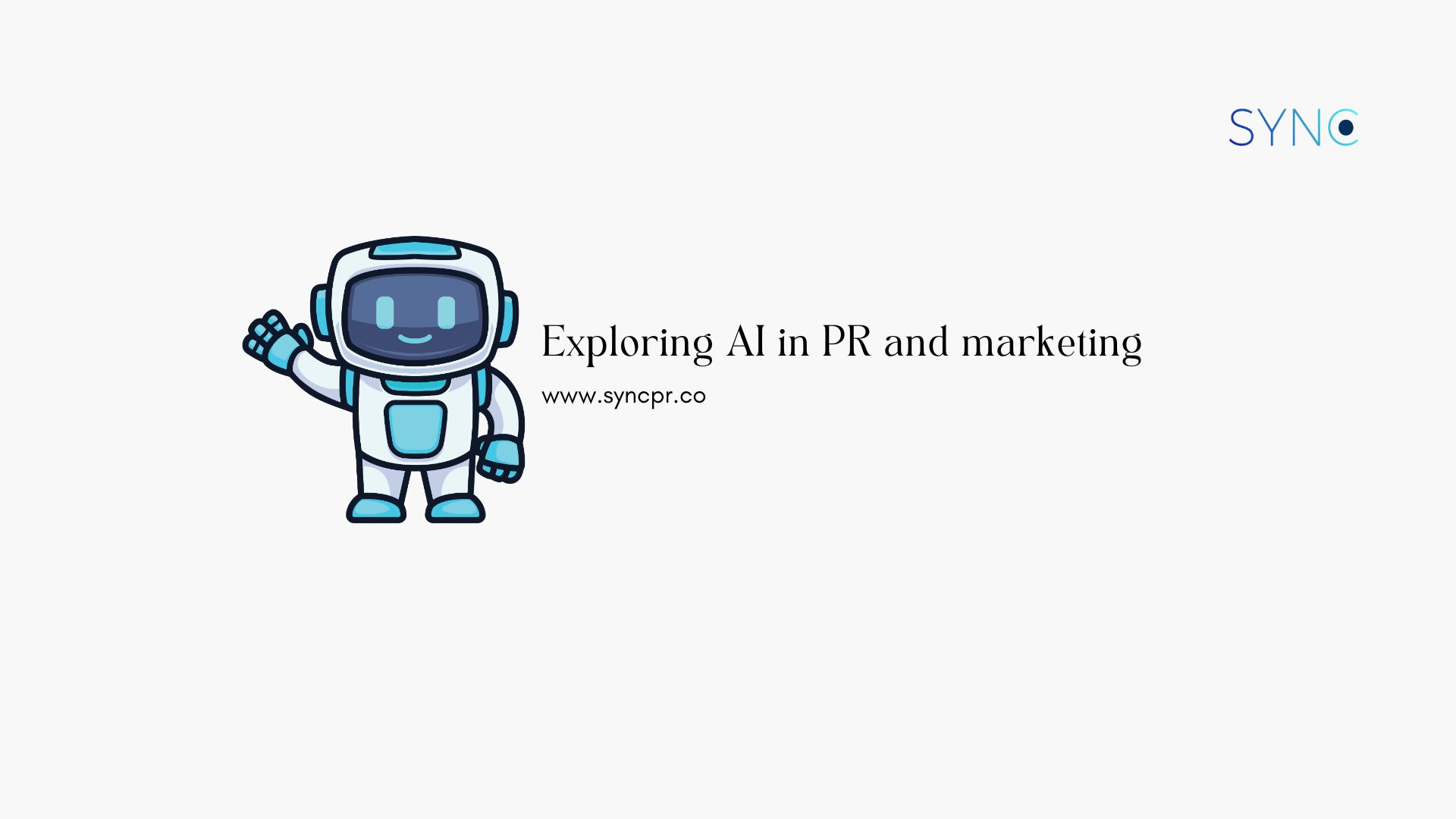Technology is advancing at a rate faster than we can often understand. The global AI market size alone is predicted to grow to an impressive $407 billion by 2027 compared to its 2022 revenue size of $86.9 billion, an exponential increase that businesses can no longer ignore in 2024. While there is still much scepticism about using AI in business processes, most of these hesitations can be addressed over time with more training and understanding of the inner workings of AI for businesses. Explore further how AI is used specifically in PR and marketing, its benefits for businesses, and how to overcome its limitations with AI best practices.
How to use AI in PR and marketing
One of the most common uses of AI in PR and marketing is rooted in its capabilities to generate content ideas. Thanks to the endless data under its belt and the AI algorithm, generative AI can be used to suggest interesting content ideas and share different inspirations to get the ball rolling. Utilising AI this way can greatly help PR and marketing professionals save time on ideation and strategic planning of content creation, which can be used in the execution phase instead to ensure an impactful end product. Furthermore, AI is capable of optimising content by identifying relevant and high-traffic keywords, ensuring that the content produced is more impactful and visible even in a highly saturated market.
On top of that, with the help of AI in PR and marketing, executives have a powerful tool on hand that can help them learn more about consumer behaviours and preferences to tailor content and pitches to the right audience. AI algorithms can generate information in a shorter amount of time to inform PR professionals better when crafting messages and pitches to the media, targeting their readership and viewers more effectively, while marketing professionals can use the same data to build on their campaigns to develop strategic and timely campaigns based on their target audience.

There are also AI capabilities integrated into other essential PR and marketing tools, allowing them to monitor different analytics and data in real-time. This is especially convenient for crisis management for PR professionals, as AI capabilities can not only manage digital interactions concurrently, it can also help with identifying potential crises before any escalation can occur. Due to its ability to process massive amounts of data in no time, AI in PR and marketing is a superpower the industry cannot simply ignore.
Read also: How to create AI video content that engages your audience
Benefits of AI in PR and marketing
The biggest benefit of AI in PR and marketing is organisational efficiency, as it eliminates the hassle of manual repetitive tasks for employees. AI can easily be programmed to take over menial day-to-day tasks while simultaneously reducing any mistakes caused by human error. This greatly helps employees to redirect to more crucial tasks that require the human touch, boosting productivity and overall efficiency in the workplace.
Other than that, as AI tools can monitor exchanges and overall sentiment in real-time during any PR and marketing campaigns, they can also provide users with insights into what specifically contributes to the effectiveness of the campaigns, or a lack thereof. This way, companies can further refine their campaign messaging, and tailor their strategies further to appeal to their target audience more successfully. Getting a better grasp on the demands of a target audience can help companies increase customer engagement and extend their customer’s loyalty as well. Simultaneously, this also contributes to a brand’s reputation management, as it informs businesses to take informed action to safeguard their image.
With AI’s data analytics capabilities, companies now have more concrete proof of the impact of their PR and marketing activities on growing their business’ bottom line, with better data directly showing ROI improvements and KPI achievements. This data also can help companies in their decision-making processes or crisis management situations down the line, allowing leaders and managers to make robust decisions more swiftly and accurately. AI in PR and marketing has a lot of scope and opportunities.
Read also: 10 AI content tools that are not ChatGPT
Limitations of AI in PR and marketing
Despite the gleaming reviews of AI and how it can revolutionise a company’s PR and marketing efforts, it is not without fault. It is important to note that AI in PR and marketing is barely leaving its nest, and like many technological advancements in its infancy, there is still more to be done before AI can be trusted to function with minimal human intervention. One such flaw in AI currently, particularly with generative AI such as ChatGPT and Bard, is concerns regarding data privacy. As AI regurgitates what has been provided to them, private and confidential information can be leaked to others, while other people’s copyrighted ideas or data that has been put through the machine could be repeated to you.
Another issue with AI is its limitation in providing the most up-to-date information. As these machines regurgitate what was previously trained of them, their information may no longer be accurate due to some changes over time. Interestingly, some outputs by these AIs are even blatantly incorrect, which are commonly referred to as AI hallucinations. Hence, using AI without fact-checking and triple-checking is not possible just yet.
Best practices for using AI in PR and marketing
While there are some barriers to using AI in PR and marketing, it would be a grave mistake to completely forego the technology. Thus, to avoid any issues in the future, here are some best practices for your company to follow when you decide to take the leap:
- Fact-checking and triple-checking are essential
As previously mentioned, factual information from generative AI tools may not always be correct, accurate, or timely. Hence, fact-checking and triple-checking your work is practically non-negotiable. Some giveaway traits of machine-generated content you should be aware of include multiple repeated phrases, odd sentence structures, awkward phrasings, as well as biassed content. While some are more jarring than others, they require human intervention to ensure authenticity and a better read.
On top of that, be sure to check for inconsistencies in the overall wording and sentence structure when using generative AI for your content. Aside from the logical inconsistencies stemming from AI hallucinations, generative AI can also create contradictory statements in its first draft due to limitations of prompts and contexts, or even caused by human error. It shows how necessary it is to sit down and thoroughly assess any output from any AI models, and why generative AI, while useful for some aspects of content generation, should never be used as a singular source for research.
- Experiment with different prompts
Prompting generative AI is also a skill in and of itself, as it requires some fine-tuning and trial and error. More context is often better to gain more specific responses, ideas and suggestions for your distinct situation. On top of that, you can also test with different styles of prompts for the same request by adjusting language styles, context, prompt length, and variations in the complexity of the request. This helps with testing out the AI model’s consistency as well as the AI’s creativity and comprehension by exploring different potential outputs.
- Take small steps and ensure open communication
Incorporating AI in PR and marketing, from generative AI to AI-integrated marketing and PR tools, requires small and measured steps so as not to overwhelm your employees. While it can be tempting to try everything and strike while the iron is hot, your staff may need more time to adapt accordingly. To avoid burnout – aside from adopting one new AI tool at a time – it is also beneficial to maintain an open channel of communication and encourage employees to converse about their concerns. This is also a good opportunity to share with your workforce success stories in AI adoption and its impact on other businesses as well as to highlight how and why you want to replicate that for your company.
Adaptability is critical to business longevity
At the end of the day, there is no denying that AI is encroaching into most industries and resisting it will only slow your business down. While there are still so many uncertainties shrouding the use of AI in PR and marketing, your readiness to embrace change is what will allow your business to continue to grow along with the rapid changes in technology. AI in PR and marketing will only grow more efficient and effective, making this the most opportune time to explore its capabilities.
If you are looking to boost your brand presence in the media and leverage AI in PR and marketing, SYNC PR can help! Find out more on our website or send us a message at hello(a)syncpr.co to get started.

